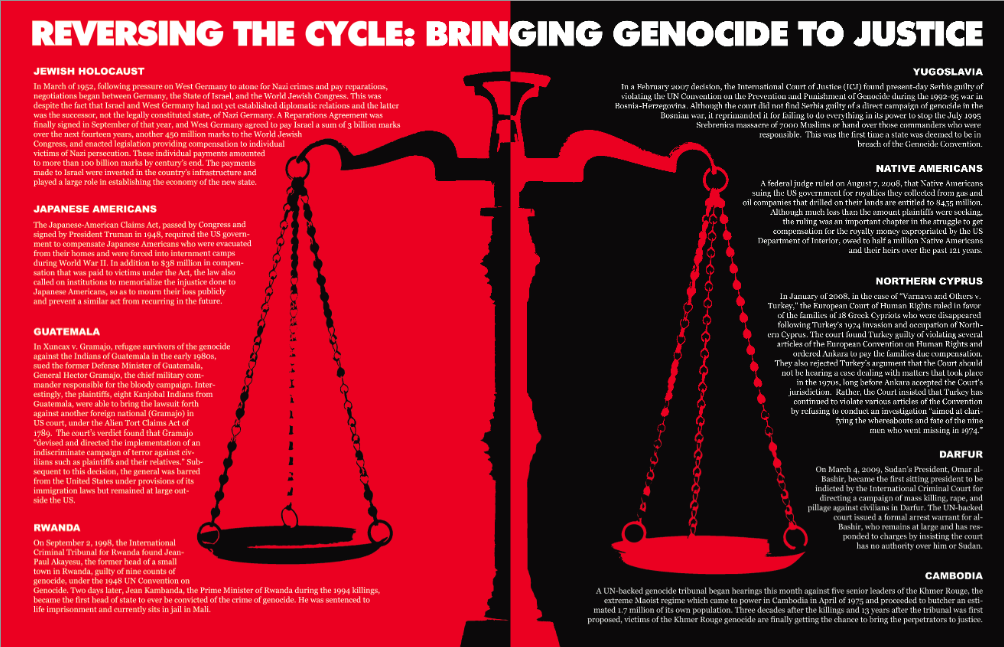Reversing the Cycle: Bringing Genocide to Justice
Jewish Holocaust
In March 1952, following pressure on West Germany to atone for Nazi crimes and pay reparations, negotiations began between Germany, the State of Israel, and the World Jewish Congress. This was despite the fact that Israel and West Germany had not yet established diplomatic relations and the latter was the successor, not the legally constituted state, of Nazi Germany. A Reparations Agreement was finally signed in September of that year, and West Germany agreed to pay Israel a sum of 3 billion marks over the next fourteen years, another 450 million marks to the World Jewish Congress, and enacted legislation providing compensation to individual victims of Nazi persecution. These individual payments amounted to more than 100 billion marks by century’s end. The payments made to Israel were invested in the country’s infrastructure and played an important role in establishing the economy of the new state.
Japanese Americans
The Japanese-American Claims Act, passed by Congress and signed by President Truman in 1948, required the US government to compensate Japanese Americans who were evacuated from their homes and forced into internment camps during World War II. In addition to $38 million in compensation that was paid to victims under the Act, the law also called on institutions to memorialize the injustice done to Japanese Americans, so as to mourn their loss publicly and prevent a similar act from recurring in the future.
Guatemala
In Xuncax v. Gramajo, refugee survivors of the genocide against the Indians of Guatemala in the early 1980s, sued the former Defense Minister of Guatemala, General Hector Gramajo, the chief military commander responsible for the bloody campaign. Interestingly, the plaintiffs, eight Kanjobal Indians from Guatemala, were able to bring the lawsuit forth against another foreign national (Gramajo) in US court, under the Alien Tort Claims Act of 1789. The court’s verdict found that Gramajo “devised and directed the implementation of an indiscriminate campaign of terror against civilians such as plaintiffs and their relatives.” Subsequent to this decision, the general was barred from the United States under provisions of its immigration laws but remained at large outside the US.
Rwanda
On September 2, 1998, the International Criminal Tribunal for Rwanda found Jean-Paul Akayesu, the former head of a small town in Rwanda, guilty of nine counts of genocide, under the 1948 UN Convention on Genocide. Two days later, Jean Kambanda, the Prime Minister of Rwanda during the 1994 killings, became the first head of state to ever be convicted of the crime of genocide. He was sentenced to life imprisonment and currently sits in jail in Mali.
Yugoslavia
In a February 2007 decision, the International Court of Justice (ICJ) found present-day Serbia guilty of violating the UN Convention on the Prevention and Punishment of Genocide during the 1992-95 war in Bosnia-Herzegovina. Although the court did not find Serbia guilty of a direct campaign of genocide in the Bosnian war, it reprimanded it for failing to do everything in its power to stop the July 1995 Srebrenica massacre of 7000 Muslims or hand over those commanders who were responsible. This was the first time a state was deemed to be in breach of the Genocide Convention.
Native Americans
A federal judge ruled on August 7, 2008, that Native Americans suing the US government for royalties they collected from gas and oil companies that drilled on their lands are entitled to $455 million. Although much less than the amount plaintiffs were seeking, the ruling was an important chapter in the struggle to get compensation for the royalty money expropriated by the US Department of Interior, owed to half a million Native Americans and their heirs over the past 121 years.
Northern Cyprus
In January of 2008, in the case of “Varnava and Others v. Turkey,” the European Court of Human Rights ruled in favor of the families of 18 Greek Cypriots who were disappeared following Turkey’s 1974 invasion and occupation of Northern Cyprus. The court found Turkey guilty of violating several articles of the European Convention on Human Rights and ordered Ankara to pay the families due compensation. They also rejected Turkey’s argument that the Court should not be hearing a case dealing with matters that took place in the 1970s, long before Ankara accepted the Court’s jurisdiction. Rather, the Court insisted that Turkey has continued to violate various articles of the Convention by refusing to conduct an investigation “aimed at clarifying the whereabouts and fate of the nine men who went missing in 1974.”
Darfur
On March 4, 2009, Sudan’s President, Omar al-Bashir, became the first sitting president to be indicted by the International Criminal Court for directing a campaign of mass killing, rape, and pillage against civilians in Darfur. The UN-backed court issued a formal arrest warrant for al-Bashir, who remains at large and has responded to charges by insisting the court has no authority over him or Sudan.
Cambodia
A UN-backed genocide tribunal began hearings this month against five senior leaders of the Khmer Rouge, the extreme Maoist regime which came to power in Cambodia in April of 1975 and proceeded to butcher an estimated 1.7 million of its own population. Three decades after the killings and 13 years after the tribunal was first proposed, victims of the Khmer Rouge genocide are finally getting the chance to bring the perpetrators to justice.



Leave a Reply
Want to join the discussion?Feel free to contribute!